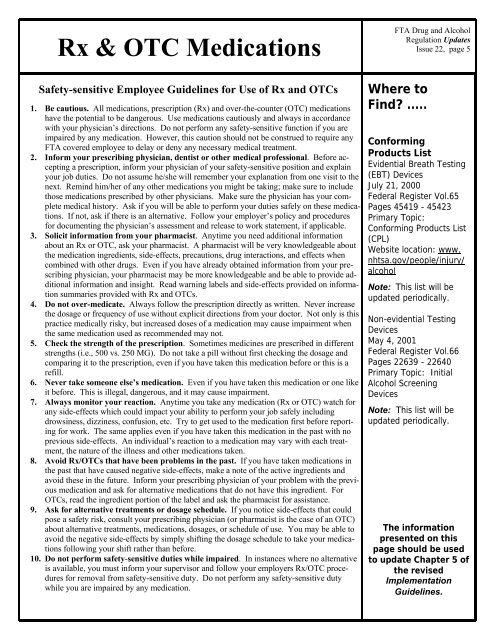Prescription and Over-the-Counter Medications Tool Kit ... - Home
Prescription and Over-the-Counter Medications Tool Kit ... - Home
Prescription and Over-the-Counter Medications Tool Kit ... - Home
Create successful ePaper yourself
Turn your PDF publications into a flip-book with our unique Google optimized e-Paper software.
Rx & OTC <strong>Medications</strong><br />
Safety-sensitive Employee Guidelines for Use of Rx <strong>and</strong> OTCs Where to<br />
Find? .....<br />
1. Be cautious. All medications, prescription (Rx) <strong>and</strong> over-<strong>the</strong>-counter (OTC) medications<br />
have <strong>the</strong> potential to be dangerous. Use medications cautiously <strong>and</strong> always in accordance<br />
with your physician’s directions. Do not perform any safety-sensitive function if you are<br />
impaired by any medication. However, this caution should not be construed to require any<br />
FTA covered employee to delay or deny any necessary medical treatment.<br />
2. Inform your prescribing physician, dentist or o<strong>the</strong>r medical professional. Before accepting<br />
a prescription, inform your physician of your safety-sensitive position <strong>and</strong> explain<br />
your job duties. Do not assume he/she will remember your explanation from one visit to <strong>the</strong><br />
next. Remind him/her of any o<strong>the</strong>r medications you might be taking; make sure to include<br />
those medications prescribed by o<strong>the</strong>r physicians. Make sure <strong>the</strong> physician has your complete<br />
medical history. Ask if you will be able to perform your duties safely on <strong>the</strong>se medications.<br />
If not, ask if <strong>the</strong>re is an alternative. Follow your employer’s policy <strong>and</strong> procedures<br />
for documenting <strong>the</strong> physician’s assessment <strong>and</strong> release to work statement, if applicable.<br />
3. Solicit information from your pharmacist. Anytime you need additional information<br />
about an Rx or OTC, ask your pharmacist. A pharmacist will be very knowledgeable about<br />
<strong>the</strong> medication ingredients, side-effects, precautions, drug interactions, <strong>and</strong> effects when<br />
combined with o<strong>the</strong>r drugs. Even if you have already obtained information from your prescribing<br />
physician, your pharmacist may be more knowledgeable <strong>and</strong> be able to provide additional<br />
information <strong>and</strong> insight. Read warning labels <strong>and</strong> side-effects provided on information<br />
summaries provided with Rx <strong>and</strong> OTCs.<br />
4. Do not over-medicate. Always follow <strong>the</strong> prescription directly as written. Never increase<br />
<strong>the</strong> dosage or frequency of use without explicit directions from your doctor. Not only is this<br />
practice medically risky, but increased doses of a medication may cause impairment when<br />
<strong>the</strong> same medication used as recommended may not.<br />
5. Check <strong>the</strong> strength of <strong>the</strong> prescription. Sometimes medicines are prescribed in different<br />
strengths (i.e., 500 vs. 250 MG). Do not take a pill without first checking <strong>the</strong> dosage <strong>and</strong><br />
comparing it to <strong>the</strong> prescription, even if you have taken this medication before or this is a<br />
refill.<br />
6. Never take someone else’s medication. Even if you have taken this medication or one like<br />
it before. This is illegal, dangerous, <strong>and</strong> it may cause impairment.<br />
7. Always monitor your reaction. Anytime you take any medication (Rx or OTC) watch for<br />
any side-effects which could impact your ability to perform your job safely including<br />
drowsiness, dizziness, confusion, etc. Try to get used to <strong>the</strong> medication first before reporting<br />
for work. The same applies even if you have taken this medication in <strong>the</strong> past with no<br />
previous side-effects. An individual’s reaction to a medication may vary with each treatment,<br />
<strong>the</strong> nature of <strong>the</strong> illness <strong>and</strong> o<strong>the</strong>r medications taken.<br />
8. Avoid Rx/OTCs that have been problems in <strong>the</strong> past. If you have taken medications in<br />
<strong>the</strong> past that have caused negative side-effects, make a note of <strong>the</strong> active ingredients <strong>and</strong><br />
avoid <strong>the</strong>se in <strong>the</strong> future. Inform your prescribing physician of your problem with <strong>the</strong> previous<br />
medication <strong>and</strong> ask for alternative medications that do not have this ingredient. For<br />
OTCs, read <strong>the</strong> ingredient portion of <strong>the</strong> label <strong>and</strong> ask <strong>the</strong> pharmacist for assistance.<br />
9. Ask for alternative treatments or dosage schedule. If you notice side-effects that could<br />
pose a safety risk, consult your prescribing physician (or pharmacist is <strong>the</strong> case of an OTC)<br />
about alternative treatments, medications, dosages, or schedule of use. You may be able to<br />
avoid <strong>the</strong> negative side-effects by simply shifting <strong>the</strong> dosage schedule to take your medications<br />
following your shift ra<strong>the</strong>r than before.<br />
10. Do not perform safety-sensitive duties while impaired. In instances where no alternative<br />
is available, you must inform your supervisor <strong>and</strong> follow your employers Rx/OTC procedures<br />
for removal from safety-sensitive duty. Do not perform any safety-sensitive duty<br />
while you are impaired by any medication.<br />
FTA Drug <strong>and</strong> Alcohol<br />
Regulation Updates<br />
Issue 22, page 5<br />
Conforming<br />
Products List<br />
Evidential Breath Testing<br />
(EBT) Devices<br />
July 21, 2000<br />
Federal Register Vol.65<br />
Pages 45419 - 45423<br />
Primary Topic:<br />
Conforming Products List<br />
(CPL)<br />
Website location: www.<br />
nhtsa.gov/people/injury/<br />
alcohol<br />
Note: This list will be<br />
updated periodically.<br />
Non-evidential Testing<br />
Devices<br />
May 4, 2001<br />
Federal Register Vol.66<br />
Pages 22639 - 22640<br />
Primary Topic: Initial<br />
Alcohol Screening<br />
Devices<br />
Note: This list will be<br />
updated periodically.<br />
The information<br />
presented on this<br />
page should be used<br />
to update Chapter 5 of<br />
<strong>the</strong> revised<br />
Implementation<br />
Guidelines.


